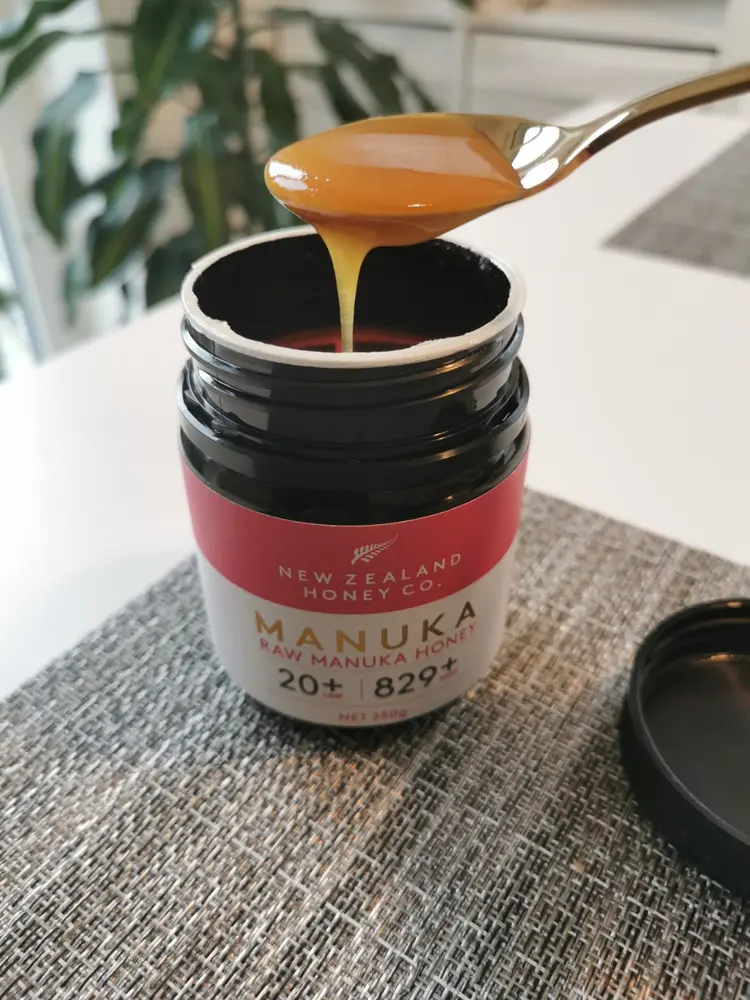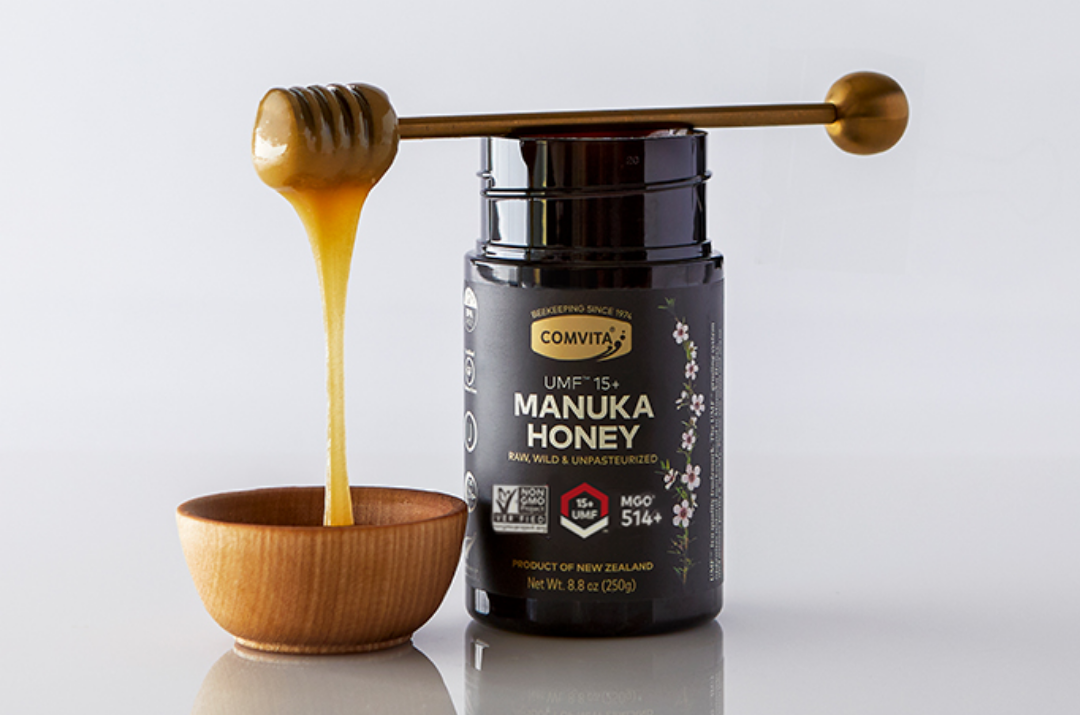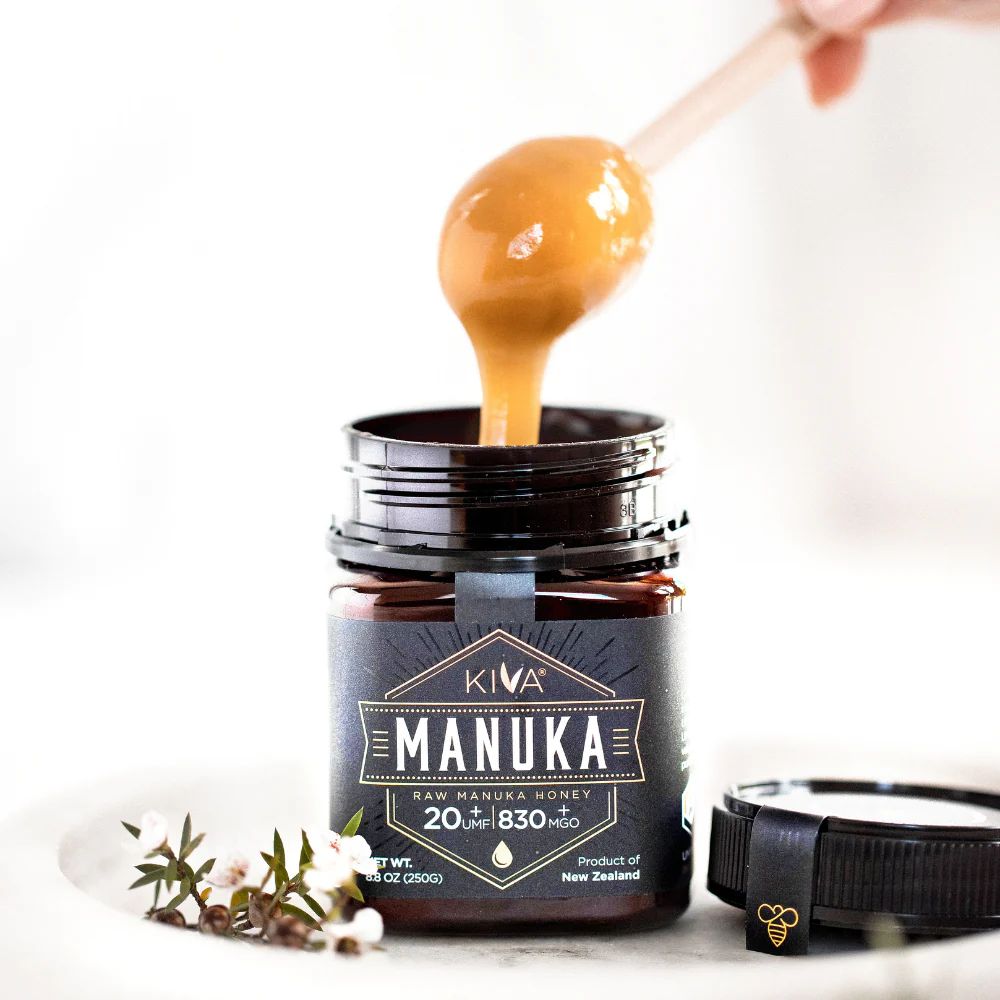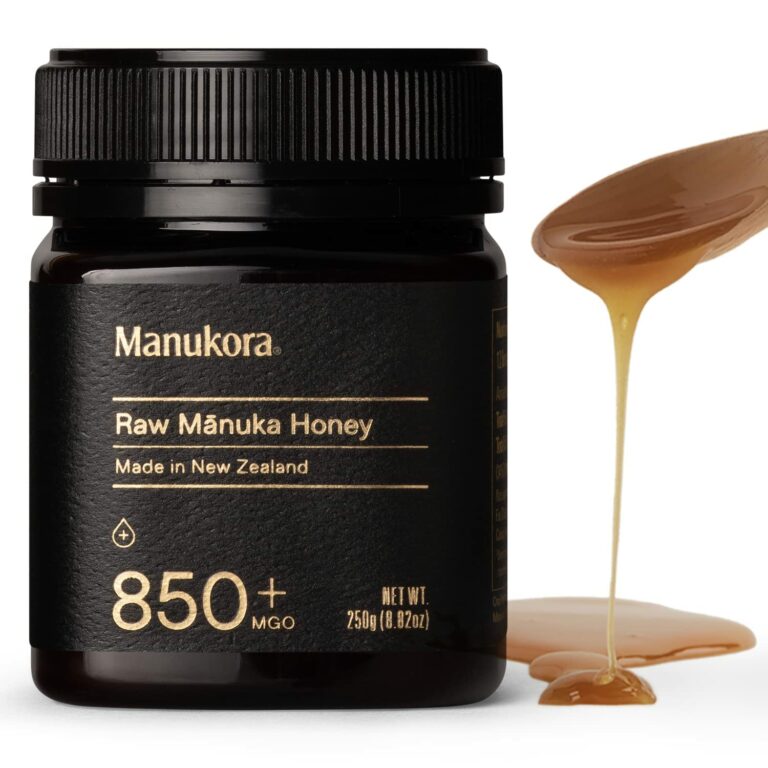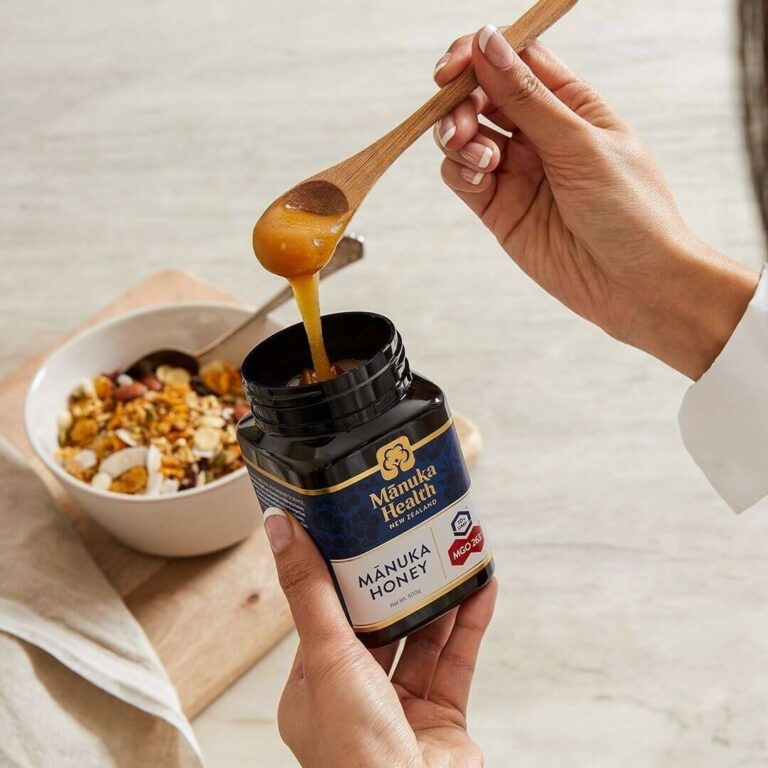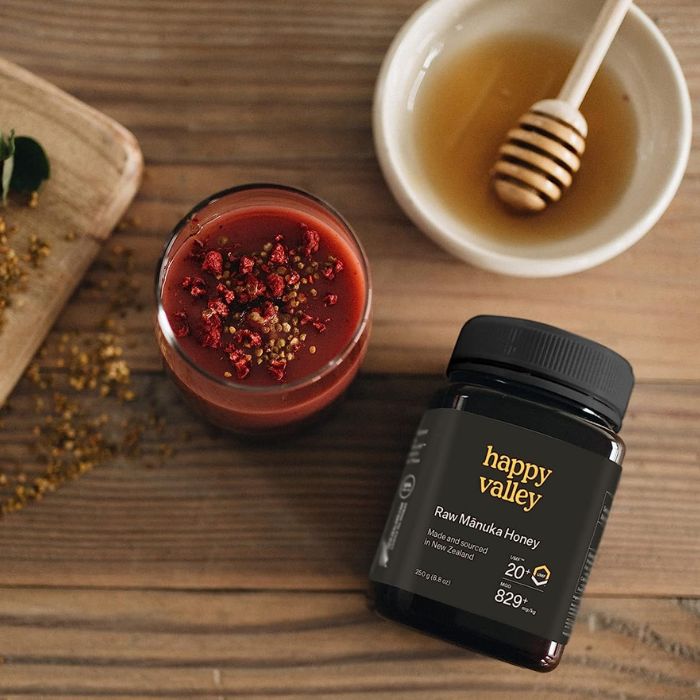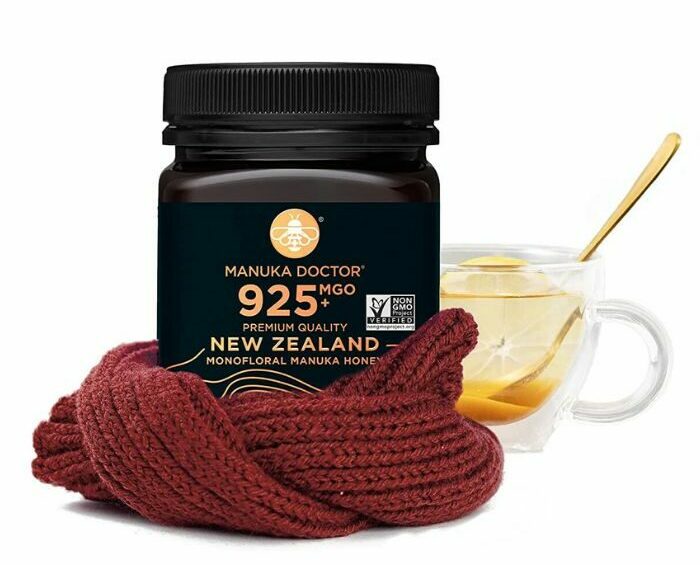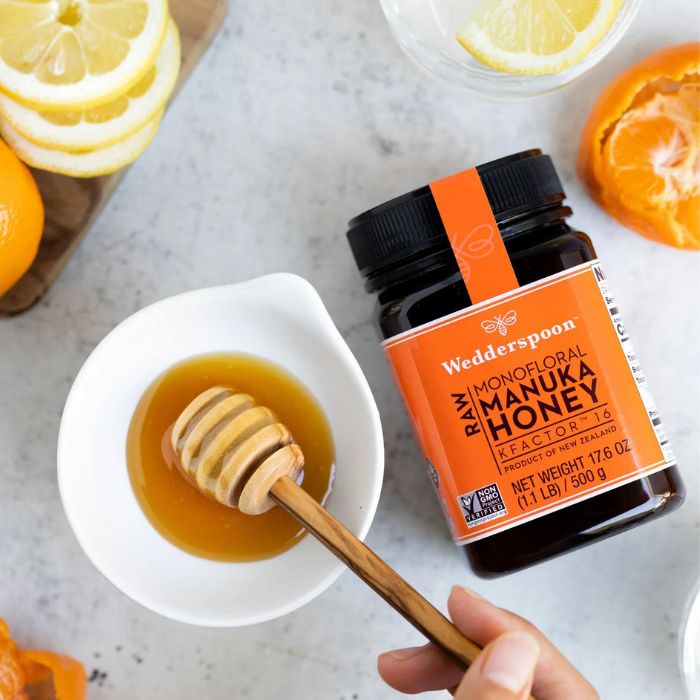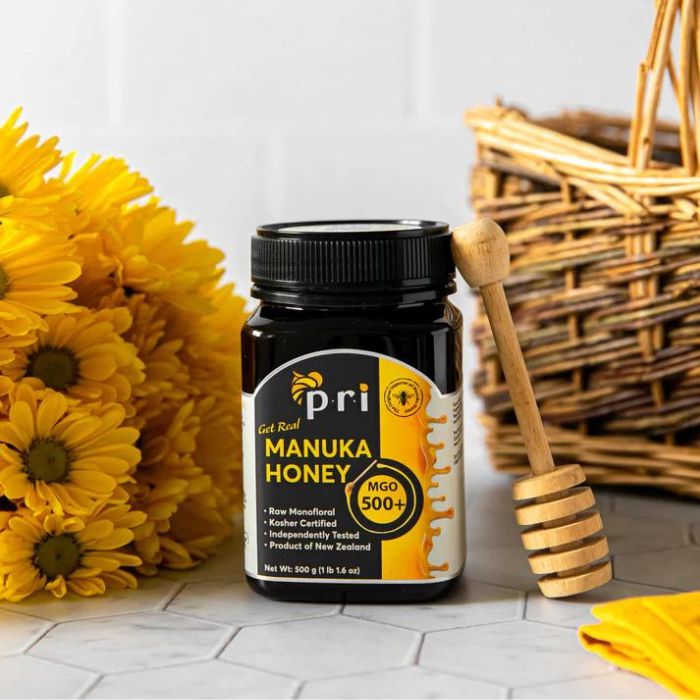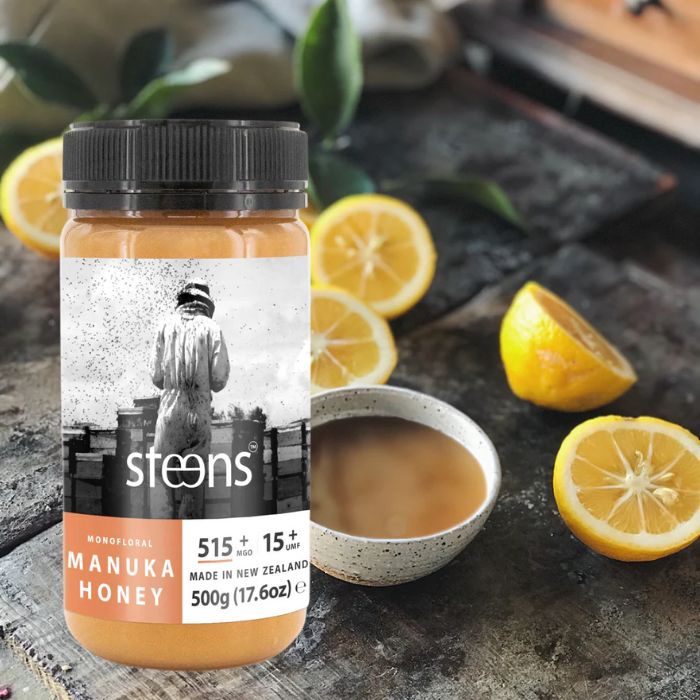10 Best Manuka Honey Brands in (2023): A Comprehensive Guide
Are you searching for the best Manuka honey on the market? You’ll find that your options are plentiful since so many manufacturers make this type of honey.
As per my research, some of the best brands include New Zealand Honey, Wedderspoon, and Comvita.
But, which one is the absolute best? In this article, we’ll find out that.
What Is Manuka Honey?
Before going any further, it would be wise to learn more about Manuka honey. What is it and what makes it different than other types of honey?
This honey is primarily made in New Zealand and Australia by bees that have pollinated tea trees. Since it can be difficult to obtain Manuka, the product is highly sought-after.
It should also be noted that this type of honey is used for an array of purposes. In some cases, it is used for medicinal reasons.
For instance, it can protect the body from bacteria while also speeding up the production of cells that repair tissue damaged by the infection. The honey is also effective in reducing inflammation.
When purchasing Manuka honey, the customer may encounter a handful of ratings such as UMF or MGO. Both labels can help the customer determine the overall quality of the honey.
UMF is used to describe the Unique Manuka Factor of the honey. MGO decides the methylglyoxal content of the honey.
Top 10 Best Manuka Honey Brands In The Market
Top Pick
1. New Zealand Manuka Honey
- It has natural enzymes and high amino acids
- 100% authentic monofloral Manuka honey, No other additives
- Antibiotic Free
- Raw and unpasteurized
- Excellent for heartburn, acidity, and other digestive issues.
- Can be used as a face cleanser or a mask.
Use coupon code “WELCOME10” for 10% Off!
The New Zealand Honey Co. is respected around the world for producing some of the best products on the market. The company’s Manuka Honey offers a lot of unique benefits. One of the biggest is the fact that the customer can choose their decide UMF rating.
The New Zealand Honey Co., a “wellness company,” is by far one of the top producers of Manuka honey. Business Director, Scott Brundell, boasts an all-natural Manuka honey originating from honeybees that feed on the Leptospermum scoparium, Manuka shrub.
The scale ranges from 5 to 28. Furthermore, the taste profile can be adjusted to match the customer’s unique preferences.
Whether you’re looking for a clean and sweet taste or a bold and intense flavor, the New Zealand Honey Co. has what you’re after.
New Zealand Honey Co. honey is 100% pure with high potency. The brand acquires Manuka honey from local apiarists (beekeepers), ranging from the urbanized region of Northland to Otago in the South Island. The fertile land consists of nutrients and properties necessary to generate and grow vibrant Manuka shrubs.
Co-owner, Marc Eurell, claims the brand supports the regeneration of New Zealand’s pastured land. Eurell and Brundell take pride in their pasteurized honey. Every ounce of New Zealand Honey Co. honey is tested for impurities, such as agrichemicals – fertilizers and pesticides.
Plus, a handful of products are available. For instance, customers can choose “The Anytime Honey”, “The Everyday Honey”, or “The Energiser”. The company’s website makes it easy to find the exact product that will best meet your needs.
New Zealand Honey also sells a Manuka Honey Spoon. The spoon ensures that you get the perfect dose every day.
Finally, the company boasts several certifications. For instance, the company is Fernmark accredited and MGO certified. The honey sold by this company is non-GMO certified and glyphosate free.
Pros
- It is easy to find the exact UMF and taste
- Tons of variations to choose from
- Save more when subscribing
- Products are free of GMOs and glyphosate
Cons
- Possibly more expensive than other companies
Customer Reviews And Ratings
Most customers have left glowing reviews for New Zealand Honey and its products. Some say they give it to their children for a cough every day.
Most love the smooth texture and consistency. The biggest complaint from customers is the cost which is more expensive than other brands.
Regardless, most of the reviews are positive because New Zealand Honey produces the best Manuka honey. Suffice to say, the extra price is probably worth it for most customers.
Use coupon code “WELCOME10” for 10% Off!
2. Comvita Manuka Honey
- UMF 15+/MGO 514+
- Raw, Wild, and Unpasteurized
- Certified Gluten-Free and Glyphosate-Free
- Distinctive, Rich Flavour and Unique Aroma
- Support Digestive Health & Respiratory System
Comvita is another reputable brand of Manuka honey. The company claims its products are the gold standard of the industry.
Each batch is certified by the UMF Honey Association. Plus, the honey is always tested by independent parties. Comvita claims to be a pioneer in Manuka honey since it has been producing these products since 1974.
The honey is sustainably sourced and unpasteurized. Furthermore, the honey can be traced from the company’s 40,000 hives to the customer’s cabinet.
The company’s honey has several certifications. For instance, it is BPA-free, gluten-free, non-GMO certified, and UMF certified.
When customers buy Comvita honey, they will most likely receive a high-quality product that won’t leave them dissatisfied.
Pros
- The product is free of BPA, gluten, and GMOs
- It is also UMF certified
- The honey can be traced back to the company’s hives
- The ingredients are sustainably sourced
Cons
- Some products are too expensive
- Product offerings are limited
Customer Reviews And Ratings
Overall, Comvita has received positive reviews. Many users say that the product works well for their sinus congestion and others love the smooth texture. The taste is often described as not being too sweet.
Users have also boasted of using the product to treat canine skin infections. Negative reviews complain about the quality of the product. Others say the bottle doesn’t contain enough honey.
The biggest issue is the price because a lot of customers feel they’re not getting their money’s worth.
3. Kiva Raw Manuka Honey
- UMF 20+/MGO 830+
- Unpasteurized and Gluten-free
- Suitable as medical grade
- Independently Tested and UMF | MGO certified
- No Antibiotics
Kiva is another company that has become popular among Manuka honey lovers. The honey is made by a small business that maintains the highest standards.
The company’s honey is always independently tested to ensure that customers are receiving the highest quality products.
The honey is at least UMF 20+ which is the same as MGO 830+. Furthermore, the company is a part of the UMF Honey Association. The honey is UMF and MGO certified.
It is also free of glyphosate. Kiva claims that its honey is traceable. Customers just need to scan the QR code to receive more information about the source.
The company has a limited selection of Manuka honey products, but it sells other supplements and superfoods.
Snap packets are available to make it easy to add the honey to your favorite drinks or foods.
Pros
- The company’s snap packets are convenient and original
- The honey is easily traceable
- The product is independently tested
- The honey is UMF-certified, MGO-certified, and free of glyphosate
- The company’s UMF Honey Association license number is proudly displayed
Cons
- The selection is limited
- The quality can be inconsistent
Customer Reviews And Ratings
Kiva has primarily received five and four-star ratings for its Manuka Honey. Customers agree that the product is always well-packed and great for treating cuts and burns.
Reviews also say that Kiva isn’t as expensive as some of the other brands. It is also good that the potency is high. Users also appreciate the smooth, creamy texture.
On the other hand, some complain that the quality is inconsistent. Some bottles are great while others are disappointing. Others don’t like the fact that the UMF 20+ variation has a medicinal taste.
4. Manukora Raw Manuka Honey
- UMF 20+/MGO 850+
- Medicinal properties and health benefits
- Produced in HACCP certified honey facility in NZ
- Potent, pure, authentic, and raw
- Verified with 15 Independent tests
Manukora manufactures raw Manuka honey in New Zealand. The company’s honey products are MGO and UMF certified. They’re also authentic and traceable from the hive to the shelf.
The product contains 100% monofloral Manuka honey. It is certified to contain at least 850Mg/kg of MGO.
Manukora Manuka Honey possesses bioactive prebiotics, unique antioxidants, and a natural antibacterial compound. The taste is described as rich and creamy caramel.
The company is a certified B corporation. A third-party tests the MGO levels and all products are free of Glyphosate residue.
You’ll also appreciate that the company engages in ethical beekeeping. Hives are not transported over long distances and honey is left on the hives to ensure the bees can survive through the winter months.
All honey is meticulously harvested to ensure that it remains 100% raw.
Pros
- The company is ethical
- The honey is 100% raw
- It doesn’t contain GMOs or glyphosates
- MGO levels are tested by a third party
- The honey is traceable to the source
Cons
- More expensive than many reputable brands
- Has a bitter chemical aftertaste and odor
Customer Reviews And Ratings
Overall the reviews left for Manukora’s Manuka Honey, most of them are 5-stars and 4-stars. Customers believe that honey is potent and effective for many medicinal purposes.
Others have called the taste delicious, but some do not like the medicinal aftertaste. Many reviewers say they love the honey, yet the price is so expensive that they cannot buy it regularly.
It is supposedly effective for healing wounds quickly. The biggest complaint from users is the high price.
Some users don’t like the plastic container or the runny consistency.
5. Manuka Health Manuka Honey
- UMF 13+/MGO 400+
- Raw, unpasteurized
- Each jar is fully traceable back to beekeeper with QR code
- Can be used for skincare treatments, as a digestive soother, and for a natural pre- or post-workout boost
- Triple Tested and UMF | MGO certified
Manuka Health produces high-quality manuka honey products using raw honey from New Zealand. The honey is suitable for vegetarians and Paleo dieters.
It is free of gluten as well. Manuka Health calls its Manuka honey a “tested and certified labor of love”. The company was founded in a rural town in New Zealand in 2006.
Now, the company’s products are used by customers in more than 45 countries. Besides selling raw Manuka honey, Manuka Health also offers lozenges and immune support products. It even sells a throat spray.
Manuka Health claims its honey has a silky smooth consistency and that the taste is utterly delicious. The honey is also traceable.
Buyers just need to scan the QR code to find out where the honey came from. The company sells Manuka Honey with various MGO ratings including 400+ and 115+.
The honey is non-GMO certified, Kosher certified, Halal certified, and glyphosate free.
Pros
- The product contains 100% manuka honey from New Zealand
- It is traceable using the QR code on the lid
- There are various strengths to choose from
- The FarnMark license number is available
- The honey is Kosher and Halal certified
Cons
- It may have added sugar
- The return policy is not favorable to the customer
Customer Reviews And Ratings
Of all reviews left for Manuka Health Manuka Honey, most of them are positive. Reviews point out that the honey tastes great and it is easy to store for long-term use.
The honey has a stick and thick consistency that works well for treating cuts and burns. Some reviewers say it is suitable for treating sinus problems.
Customers say it goes on velvety smooth when being used as a face mask. Unfortunately, several reviewers weren’t satisfied with the product.
The quality can be inconsistent. Some customers have received bottles with broken seals.
Another reviewer complained that the product now has added sugar.
6. Happy Valley Manuka Honey
- UMF 20+/MGO 850+
- 6 point quality system
- Each jar of honey is fully traceable back to the source
- Antibiotics free, Gluten free
- Independently Tested and UMF | MGO certified
Happy Valley is a growing brand that sources its Manuka honey in New Zealand. The products are also made there.
Happy Valley sells a handful of Manuka honey products with various strengths. Users can choose between MGO 50+, UMF 5+, UMF 10+, UMF 15+, or UMF 20+.
With so many options available, customers should have no trouble finding the product that will work well for them. The honey is independently tested and certified in a lab.
All products from Happy Valley are 100% traceable to the source. The company also prides itself on sustainably sourcing its ingredients.
During the harvesting and manufacturing process, Happy Valley makes sure there is as little human interference as possible. It also tries to avoid overheating the honey and destroying its natural properties.
Instead, the company takes steps to preserve the natural aromas and flavors of the honey. The products from Happy Valley do not contain any Genetically Modified Organisms. Plus, it follows organic practices.
Pros
- Various strengths are available
- The products are independently tested and certified
- The ingredients are traceable to the source
- Human interference is minimal during the harvesting and manufacturing phases
- The honey is as raw as possible
Cons
- The price could be cheaper
- The shelf life is limited
Customer Reviews And Ratings
The majority of reviews for Happy Valley Manuka Honey are positive, but the product has many negative reviews too.
Some claim they’ve been able to eliminate their acne using this honey and Himalayan salt. Most agree that the benefits are worth the added cost.
Customers like the fact that the honey melts in their mouths. However, many customers complain about the plastic jar.
Since it is so expensive, reviewers expected the product to be in a glass jar. Others have received the wrong strengths. The good news is that the customer service is excellent so the company will resolve these issues.
7. Manuka Doctor Manuka Honey
- MGO 925+
- Raw and Non-GMO
- Hive to Home: 100% Traceable
- Harvested, Packed & Tested in New Zealand
- Max strength manuka honey
Manuka Doctor makes its Manuka honey using honey sourced in New Zealand. The honey is also packed in New Zealand.
The MGO ratings are based on tests by independent labs. The honey is New Zealand Government Certified Manuka Honey and traceable to the hive.
Manuka Doctor is proud that has consistently sourced its ingredients using sustainable methods. The company’s beekeepers go above and beyond to ensure that the bees are properly cared for throughout the year.
The company also has a Manuka planting program to ensure that the bee population will remain high for many years to come. The products feature the MGO rating on the front so customers can easily find what they’re looking for.
The products are sorted into different categories to make it easy to find what you want. For instance, some of Manuka Doctor’s products are designed for everyday use while others are made for an everyday boost.
It also sells maximum-strength Manuka honey. Other supplements are also available from Manuka Doctor.
Pros
- The products are made using authentic Manuka honey from New Zealand
- The company follows sustainable practices to protect the bees and the environment
- All honey is harvested and packed in New Zealand
- It is New Zealand Government Certified Manuka Honey
- The honey can easily be traced to the hive
Cons
- It could be the most expensive Manuka honey vendor
- The return policy is iffy
Customer Reviews And Ratings
More than 70% of the reviews for Manuka Doctor’s Manuka Honey are 5-star reviews. Most of them are positive, although there are a few exceptions.
Reviewers praise the Manuka honey for being great for people with sensitive stomachs. It also allegedly helps open wounds heal much faster.
Reviewers say that the Manuka honey from Manuka Doctor is delicious on muffins, bagels, biscuits, and toast. Many are satisfied with the taste, even though it may be too sweet for some users.
One negative review claimed the user had a bad reaction to the Manuka honey because it was too strong.
Others say that it did not provide any healing benefits. Therefore, the results may depend on the user and the strength they’re using.
8. Wedderspoon Raw Premiums Manuka Honey
- Has own grading system called K-factor
- Triple-filtered & gently creamed for rich, smooth flavor
- Multi-floral and mono-floral variations
- Raw, unpasteurized and non-gmo
- Sourced and packed in New Zealand
- Free of antibiotics, pesticides, and glyphosate
Individuals looking for a cheaper alternative may be happy with the products from Wedderspoon. When compared to New Zealand Honey, Wedderspoon is much cheaper. Regardless, the company still has a lot to offer.
The honey is free of pesticides, glyphosate, and antibiotics. There is also a surprisingly large selection to choose from. However, the selection is not as diverse as what is offered by the New Zealand Honey Company.
Still, there should be enough to satisfy most customers. Available KFactor ratings include 12 and 16. It is also possible to buy this honey in a squeeze bottle to make it easier to use.
The honey is non-GMO certified and Kosher.
Pros
- Wedderspoon has a decent selection
- The products aren’t too expensive
- Products are Kosher and non-GMO certified
- The honey is smooth and easy to use
- Squeeze bottles are available
Cons
- Delivery can be slow
Customer Reviews And Ratings
Most customer reviews for Wedderspoon Honey are positive. Many people are satisfied with the taste and consistency of the honey.
Customers agree that the product works well for medicinal purposes. Nevertheless, there are certain negative reviews with one saying the product is not organic.
Another has complained about the delivery time. Customers interested in buying Wedderspoon will have to be patient when waiting for the honey to come.
9. PRI Manuka Honey
- MGO 500+
- Raw, cool-processed, unpasteurized and minimally filtered
- Monofloral
- improve digestion and immunity, soothe coughs and sore throats, and for skin care
- Kosher certified
PRI stands apart because the company’s honey is produced by family-owned beekeepers. The company is an original importer of manuka honey. It embraces sustainable efforts to protect its bees and the environment.
All Manuka Honey from PRI is free of antibiotics. All Manuka products are made using 100% Manuka honey sourced in New Zealand. The products are made using raw honey and cool processing procedures.
As a result, the honey is unpasteurized and unheated. This helps preserve the health benefits of the Manuka honey. The products are also MGO certified and independently tested.
No GMOs are used during the manufacturing process at any point. Customers will be thrilled to learn that PRI offers a handful of Manuka honey products.
For instance, they can buy honey sticks, lozenges, nuggets, and oral sprays.
PRI is adamant about ensuring that the bees remain happy and healthy. As a result, a portion of the proceeds will be donated to campaigns and charities that protect bees around the world.
Pros
- The prices aren’t outrageous
- Several strengths are available
- The company tries to protect the environment, bees, and customers
- It is pure New Zealand honey
- Various product types are offered
Cons
- Slightly misleading since the UMF rating isn’t specified
- The honey can be gooey
Customer Reviews And Ratings
Based on customer reviews, it seems most have been satisfied with PRI Manuka Honey. After all, the honey has primarily received 4 and 5-star ratings. Customers like the fact that the company’s products aren’t too expensive.
Reviewers also say that the taste is great, and many love the soft consistency. Others like the fact that PRI’s Manuka honey doesn’t have an odd aftertaste.
It also mixes well with tea and other drinks. Customers have made several complaints, though. The label is slightly misleading because it doesn’t clearly specify the UMF rating.
In some cases, the seal will be broken when the bottle arrives, so there could be quality control problems. Finally, the return policy isn’t great.
10. Steens Monofloral Manuka Honey
- UMF 15+/MGO 515+
- Uses Whole Comb Technology
- Extracted naturally and maintains the goodness of fresh honeycomb
- Raw, unpasteurised, and minimally processed
- Home to hive traceability
- Thick and slightly grainy texture
- Can be used as a homemade remedy for skincare and beauty and wellness regimes
Steens sells some of the highest-quality Manuka honey products on the market. As a result, its products have won many awards. Steens believes in producing minimally processed Manuka honey.
By following these practices, the company produces raw unpasteurized Manuka honey. The honey retains its natural smell, taste, amino acids, and enzymes.
The company’s products are traceable to the hive and UMF certified by the UMF Honey Association. Steens has warehouses in the UK, United States, and New Zealand to ensure products are delivered quickly.
Besides selling Manuka honey, it also offers sachets and native bush honey in buckets. The Manuka honey products are available with various UMF ratings.
Pros
- There are many UMF ratings to choose from
- The sachets are good for convenient use
- The honey is raw and unpasteurized
- The company’s whole comb technology ensures that only the wax is removed
- The honey can be traced back to its hive
Cons
- Steens products are very expensive
- The honey may be crystallized when it arrives
Customer Reviews And Ratings
Steens Raw Manuka Honey has received a lot of positive reviews with a handful of critical reviews. The company is respected for selling high-quality honey that works well for the intended purpose.
The flavor is unique although most customers enjoy it. Some even call it amazing. Reviewers say that this could be the best Manuka honey for people with sensitive stomachs.
According to reviews, it works well for sore throats. One issue reviewers have is that the bottles might leak during shipping. This seems to be a common problem.
Others have complained about the honey crystallizing by the time it arrives. The company has a satisfaction guarantee so it may be possible to rectify these problems easily.
Manuka Honey Grading Systems
Manuka honey is graded using a handful of systems. For instance, it is common for these products to have MGO, UMF, or K-Factor ratings. If you’re going to buy and use Manuka honey, it is pertinent to learn more about these grading systems.
Most experts agree that UMF is the most reputable measurement system. The number helps determine the amount of MGO in the honey.
The MGO rating identifies the methylglyoxal content. The TA rating measures the Total Activity of the honey. It evaluates the non-peroxide activity and peroxide activity in the honey.
In other words, this can tell the customer how effective the honey is at destroying bacteria. The K-factor rating is exclusive to Wedderspoon.
It is used to identify the amount of pollen in the honey so the buyer will know how pure it is. When purchasing Manuka honey, it is pertinent to use these grades to get the best product.
Factors To Consider When Choosing Manuka Honey
When purchasing Manuka honey, customers must consider a handful of characteristics. The most important will be explored below.
1. UMF And MGO Ratings Explained
The UMF rating described the purity and quality of the Manuka honey. MGO is used to identify the amount of methylglyoxal in the honey. The latter is a naturally occurring company found in Manuka honey. It is best to use the UMF rating when choosing Manuka honey. A higher UMF rating means that the honey contains more MGO and is more powerful.
2. Authenticity And Quality Assurance
Customers should choose reputable, trustworthy brands. It is also important to make sure that the company’s honey is certified by the leading agencies. For instance, the honey should be UMF-certified and non-GMO certified. It is also important to see if the company is registered with Fernmark.
3. Sourcing And Production Process
To get the best Manuka honey, the company must properly source and produce the honey. The customer should be able to trace the honey back to its hive. New Zealand is the best source of Manuka honey. The producer must also use sustainable beekeeping practices to avoid harming the bees or the environment.
Usually, it is best for there to be as little human interaction as possible. Doing so ensures that the customer receives the purest Manuka honey.
4. Packaging And Storage
The company must also ensure that the Manuka honey is properly packaged and stored. It shouldn’t be refrigerated because this will cause it to solidify. Instead, it should be stored in a way that preserves its natural flavors, aromas, and beneficial properties.
The packaging is also important because the honey will likely be shipped. Glass jars are always better, but they should be free of BPA regardless. The packaging must be reliable enough to prevent leaks during shipping.
Top Benefits And Uses Of Manuka Honey
Health, Dietary, And Wellness Applications
Manuka honey has dozens of scientifically-proven health and dietary benefits. Consumers across the globe have long since added a few teaspoons of Manuka honey to their diet. The dietary benefits are remarkable compared to granulated sugar and other sweeteners.
Manuka honey is rich in antioxidants and antibacterial properties that combat cancer, colds, skin infections, and delayed healing. Consumption and administration options are endless.
Research validates the effectiveness of Manuka honey in speeding up healing, combating acne, and reducing inflammation. Moderate consumption soothes an itchy, inflamed throat in adults and children.
Manuka honey can be applied directly to abrasions, burns, and lacerations. The anti-inflammatory properties and antioxidants in Manuka honey accelerates the health process, reduce bruising, fights infection, and decrease the death of tissue.
Manuka honey has antifungal properties that may improve circulation to injured areas. It can also help prevent the growth of yeast and other fungi.
Culinary Uses And Recipes
Manuka honey can be used for culinary purposes as well. It is possible to cook and bake with Manuka honey. Ultimately, this will provide the user with a variety of benefits.
If you’re using the best Manuka honey, it will enhance the taste of the dish while providing medicinal perks. Manuka honey can replace conventional honey in any recipe.
Manuka honey can be used to cook healthier chocolate peanut butter eggs for Easter. Manuka honey can also enhance many recipes, such as a fall harvest salad or honey-glazed pecans.
Alternatively, Manuka honey can be added to many drinks, such as margaritas, teas, and hot chocolates. You can even add a few drops of Manuka honey to your smoothies.
How To Choose The Right Manuka Honey For You
There are various Manuka honey brands of varying prices, KFactor ratings, potencies, and types. Every consumer has a unique taste preference, budget, and health needs. The consumer’s specific needs and preferences will determine which Manuka honey is best.
Traceability allows consumers to verify the true origin of Manuka honey. With the high price tag attached to many brands, Manuka honey traceability is a must. It validates the origin and authenticity of the brand.
The processing method is crucial for the integrity of Manuka honey. One specific processing – unpasteurized – is void of an artificial heat source. Unpasteurized Manuka honey is processed in a manner to protect its nutritional properties in Manuka honey.
Pasteurization applies extremely high temperatures of over 158 degrees Fahrenheit (70 degrees Celsius) to process Manuka honey. While pasteurization improves the color and eradicates yeast, mold, and bacteria, heat destroys the natural antioxidants in Manuka honey.
UMF and MGO grading helps consumers find the best Manuka honey for their specific health needs.
Manuka Honey Storage & Handling Tips
Since the water content is extremely low, Manuka honey is at a high risk of bacteria growth. Manufacturers utilize quality containers with seals for their Manuka jars of honey. The seal embedded into the lid keeps out moisture which has been shown to encourage bacteria growth.
The container should have a dark coloration – black, dark blue, dark brown – to eliminate exposure to natural and artificial lighting. Manuka honey does not deteriorate when exposed to light. However, the light can encourage harmful bacteria growth.
Manuka honey has an average best-before date (expiration date) of 24 months. Anything can happen within the 24-month period. For example, the original container can be dropped and cracked or chipped. In this case, it is vital to find an appropriate replacement.
It is recommended to choose a glass jar with a lid embedded with a durable seal. A dark-colored jar is preferable but a clear glass jar will suffice as long as the Manuka honey is stored in a dark area.
Never store Manuka honey, in a metal container, even if the lid has a durable seal. When Manuka honey is exposed to aluminum and other metals utilized in food-grade containers, it can oxidize.
Never Store Manuka Honey In Refrigerated Conditions
It would seem the best place to store Manuka honey in a chilled or refrigerated compartment. Meat, dairy products, sandwich dressings, eggs, and vegetables are stored in refrigerated compartments to prevent both rot and microorganism reproduction.
Manuka honey is a unique food comprised of a mixture of glucose and monosaccharide fructose. Cold temperatures not only cause Manuka honey to turn into a semi-solid lumpy mass but also alter natural properties.
The best way to find the perfect unrefrigerated storage for Manuka honey is room temperature monitoring. Select three suitable locations like a pantry, cupboard, basement, or cellar. Place a thermometer in each location and periodically document your findings throughout the day and night if possible.
The room temperature should never scale above 75 degrees or below 65 degrees Fahrenheit. It can also help to measure the humidity levels, especially if the preferred area is a basement or cellar.
Never Expose Manuka Honey To Natural Or Artificial Heat Sources
Like refrigeration, heat alters the flavor, color, consistency, and properties of Manuka honey. Manuka honey is oftentimes added to coffee, tea, and other warm beverages.
Adding to hot beverages could minimize the health benefits by altering the nutrients, antioxidants, iron, and other properties. To protect the natural antibacterial agents and enzymes, it is recommended to add Manuka honey to room-temperature beverages.
Heat, regardless if it is natural or artificial, can cause Manuka honey to lose glucose oxidase and destroy diastase and invertase enzymes.
Is It Safe To Ingest Manuka Honey Darker Than Usual?
Perfect storage conditions do not always prevent the natural color of Manuka honey from darkening. The first thought, darker-than-normal Manuka honey is bad which is not always the case.
The best way to determine if the color represents bad Manuka honey is by reassessing the storage conditions. If the temperature, humidity, and lighting are correct, the Manuka honey is probably safe for human consumption.
Frequently Asked Questions
How Long Does Opened Manuka Honey Last?
Every brand stamps its Manuka honey with a best-before date or expiration date. The factors that determine the preferred date of consumption include the processing method, type of honey, and government regulations. The average expiration date is two years for Manuka honey.
When properly stored, Manuka honey can be safely consumed up to three years from the initial opening date.
Should Manuka Honey Be Refrigerated?
No, the best storage method is outside the refrigerator, in a dark area where temperatures do not drop below 65 degrees Fahrenheit and scale above 75 degrees Fahrenheit.
Can Manuka Honey Reduce Weight?
Yes, but only with the proper consumption. An American Heart Association report recommended 36 grams or nine teaspoons of Manuka honey daily for men. The recommended daily consumption for children over the age of 18 months and women is 24 grams or six teaspoons.
The proper consumption can aid in weight loss but any extra could result in minimal or significant weight gain.
Which Manuka Honey Is Best For The Immune System?
New Zealand Honey Co. honey is stamped with a Unique Manuka Factor “UMF” rating. The rating validates leptospira, DHA, and MGO in honey. DHA supports optimal immunity in adults and children over 18 months.
Which UMF Or MGO Honey Is Better?
New Zealand Honey Co. offers a high potency, 100% raw honey.
What Does K-Factor Mean In Manuka Honey?
K-Factor represents the Manuka pollen count. The grading system – Kfactor 12, KFactor 16, and KFactor 22 – does not include the antibacterial compression strength or activity in Manuka honey.
What Is The Best Time Of The Day To Eat Manuka Honey?
To maximize the health benefits of Manuka honey, it is recommended to consume up to four teaspoons (16.7 grams) first thing in the morning. Experts believe it is possible to achieve similar results when consuming Manuka honey before bedtime.
Who Should Not Take Manuka Honey?
Children 18 months of age or younger and people with honey allergies should not ingest Manuka honey. Diabetics should only add Manuka honey to their diet moderately, followed up with a blood glucose reading.
The medical community advises people with bee allergies to avoid Manuka honey.
